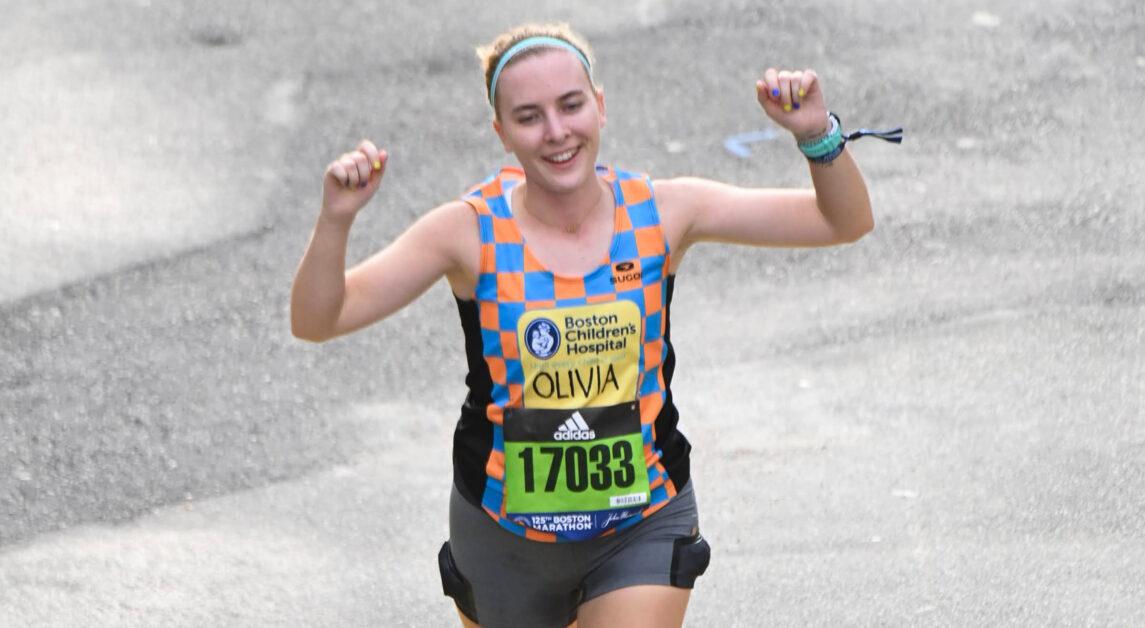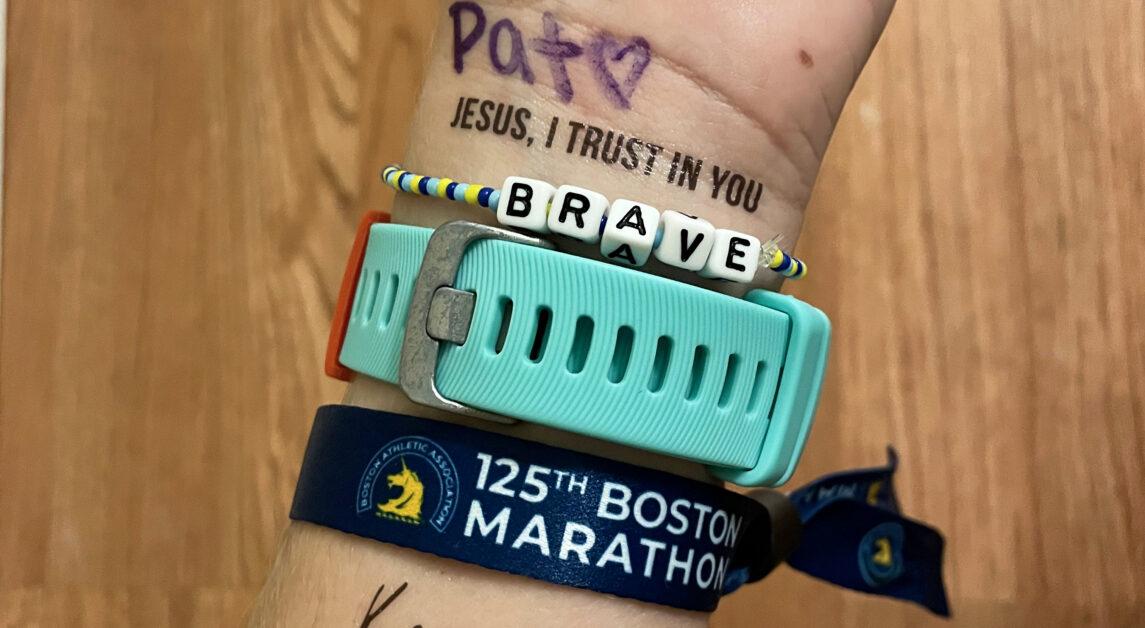For senior Olivia Colombo, Lynch ’22, running is not a new part of her life. She grew up running throughout her childhood and into high school. Colombo, who is enrolled in a five year master’s in social work program at BC, wanted to continue running and was working toward being recruited to college, she said, when gastrointestinal health issues began to interfere.
When she came to BC, Colombo joined club running to try to keep doing what she loved, she said.
“Very quickly, I was passing out on runs and … health stuff was interfering and [I] had to kind of step down from that freshman year, which was disappointing,” Colombo said.
Her first Marathon Monday at BC was captivating, Colombo said. Despite her health issues becoming more persistent and debilitating, she set her sights on trying to run the Boston Marathon before graduating from BC, she said.
“I actually remember having a conversation at [Boston] Children’s Hospital with one of my doctors … and the doctor had gone to BC as well … and I was like, ‘I really want to do this before my senior year,’ and asking this doctor how feasible she thought that that goal was.”
The doctor told Colombo that it would be ridiculously hard given her health situation, but said that she would give her full support if it would be safe and doable.
“I feel like that was the first real conversation that I had about it,” Colombo said. “I thought about doing it my sophomore year and then COVID got in the way … everything just fell into place for senior year.”
Last spring, her health deteriorated to its worst—Colombo still had no diagnosis and her condition kept being brushed off by medical professionals as being due to anxiety, an eating disorder, or common conditions like irritable bowel syndrome. Last February, she spent so many nights in the hospital that she nearly had to withdraw from school.
After first reading about the condition online herself, Colombo told her doctors that her symptoms matched the profile of Median Arcuate Ligament Syndrome (MALS).
“It’s a super rare condition … most doctors, if you walk into an ER have never heard of it, which is why it took so, so long to be diagnosed,” Colombo said.
Finally, Colombo got her diagnosis from the MALS team at Massachusetts General Hospital , meaning she would need to get MALS surgery. Before knowing when her surgery date would be, Colombo was also offered a bid to run in the Boston Marathon by Children’s Hospital.
“I kind of made the decision that I was kind of tired of MALS controlling my life, and that even if surgery was after … I was gonna cross that finish line,” Colombo said. “Luckily, surgery was the shortest amount of time away from the marathon that would give me enough time to have surgery, recover, finish training in like a reasonable enough amount of time, and then run.”
On July 14, Colombo had surgery, which entailed six incisions into her abdomen, she said. Right after, she had to turn her focus to getting back up and running—literally—in time for the marathon.
“I think it made it a little bit stressful knowing that there was a hard deadline for recovery, but … it also motivated me to get back on my feet very quickly,” Colombo said. “I had actually, before I knew when surgery was, signed up to run the Falmouth Road Race, which was mid August. I think I started running a week before Falmouth … that’s a seven-mile race, so nothing like a marathon, but also nothing to be laughed at either.”
Upon returning to school, Colombo had the idea to do a cookie fundraiser at BC to support her goal for Children’s Hospital. Initially thinking it would only spread to her group of friends, Colombo set up a system where customers could pay by Venmo for a cookie delivery right to their dorm.
“A parent shared the flyer that I made in the BC freshmen parent Facebook group,” Colombo said. “All of the freshmen parents started ordering cookies to their freshman dorms … it was close to 1,500 cookies. It took a team … I think there were like eight different kitchens involved in different dorms.”
Balancing training with fundraising and school work was no easy feat, so most of Colombo’s long runs occurred on Saturdays. Toward the end, she was finally able to train with her Children’s Hospital teammates, which was very special, she said.
“I kind of wish that I’d been able to do that all along, but, like, they were sticking to a training plan and I was building up from nothing,” Colombo said. “I loved being with the team so much and I loved running with them race day … I can see why so many people on that team run for 10 years or more raising money for Children’s Hospital.”
Another way that Children’s Hospital shaped her marathon experience was through her patient partner. Colombo was paired with a current Children’s patient named Emma, to whom she wrote many letters and emails, especially in the week leading up to the race, she said.
“Kind of a motto that my family had, and it also is part of the motto of the Children’s team, is ‘strong and brave,’” Colombo said. “I made friendship bracelets for my patient partners that we both wore on race day and one of ours says ‘strong’ and the other one says ‘brave.’”
The back of Colombo’s bib also read, “I run for Emma because I beat MALS.” Many people with MALS refer to life after surgery as “Life 2.0,” Colombo said, so she also wrote that on her bib.
Emma was not the only person that Colombo was running for on the course—Patrick Gregorek, a friend of Colombo’s who died during her freshman year at BC was also a big part of her marathon journey, she said.
“I wrote Pat’s name on my wrist, and Pat was a runner too,” she said. “Just kind of thinking about like, ‘Okay Pat, just get me to BC’… like, ‘Let’s run this together,’ sort of thing.”
Colombo said she went out faster than she was used to for the first 10 miles, running alongside her Children’s teammates, which made the latter half of the marathon even tougher, especially during the hilly region in Wellesley. Through the struggle, she knew she just had to get to BC, and once there, she would be able to finish, she said.
“Mile 21 was hands down my favorite,” she said. “My friends did so many things to make the day really special, because obviously having the marathon is a big deal but also like celebrating the fact that I beat MALS.”
After passing her friends holding face cutouts and signs and even some who hopped the corral to run alongside her for a bit, Colombo finished the marathon, just months after MALS surgery.
Through running the marathon, Colombo was able to show herself that she still has the same strength and grit that allowed her to get through the hospital stays and beat MALS, she said.
“I still have that same strength and grit … I didn’t burn it out, I didn’t lose it, I didn’t use it up,” Colombo said. “I had the same strength on the marathon course, and kind of by extension, know that I am still capable of being strong and brave, and any other things that I face coming up … the end of senior year, transitions, things like that.”
Running a marathon requires a readiness to take on the time commitment, Colombo said—but finding out your “why” is even more important.
“Nothing else is going to get you through those Newton hills or those, like, five-hour runs in the heat except for your why,” Colombo said. “Having Pat’s name on my wrist, thinking about my patient partner, thinking about the journey with MALS, and like letting this be kind of my victory lap … I would not have finished without any of that.”
Photos Courtesy of Olivia Colombo








